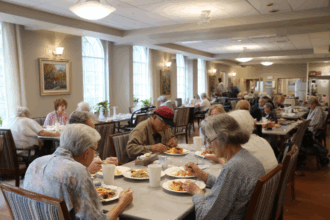Homelessness affects not only young people but also a growing number of older adults, as highlighted in an analysis in CMAJ (Canadian Medical Association Journal). Visible signs of ageing are often evident at younger ages among individuals experiencing homelessness compared to those with stable housing. This population frequently suffers from earlier onset of chronic medical conditions and age-related issues like cognitive impairment.
The risk of premature death among older homeless individuals is notably higher—3.5 times greater than their housed counterparts, particularly for those experiencing homelessness for the first time later in life. In 2021, 32% of individuals in Canadian shelters were aged 50 and older, with many others living outdoors or temporarily with friends or family.
Dr. Jillian Alston, a geriatrician at St. Michael’s Hospital, Unity Health Toronto, and her coauthors stress the need for shelter policies and government strategies tailored to the care needs of older adults experiencing homelessness. They advocate for age-friendly shelters with appropriate physical environments, adequate staffing, and access to essential medical services. These individuals often face substantial marginalization, dehumanization, and structural violence, necessitating care models focused on building trust, establishing rapport, and ensuring personal safety.
It is crucial to provide housing that meets individual needs to support older adults at risk or experiencing homelessness. Conditions like cognitive impairment and mobility issues, common with ageing, can challenge housing stability. Preventive measures include tenancy monitoring programs, personalized in-home supports, and community initiatives addressing social isolation. Health care programs within shelters, such as primary care and geriatric outreach services, play a vital role in supporting older adults.
Innovative housing solutions, such as The Oaks in Ottawa, demonstrate effective models for permanent supportive housing that accommodate ageing. Long-term care homes may provide the most suitable environment for some individuals to address their complex needs.
Addressing this pressing issue requires collaborative efforts across health care, long-term care, public health, housing sectors, and community support. Trauma-informed approaches are essential for individuals who have experienced adversity and trauma earlier in their lives.
Dr Andrew Boozary, Dr Catherine Varner, and Dr Andreas Laupacis emphasize the profound human toll of homelessness in their editorial. Chronically unhoused individuals have significantly shorter lifespans, experience accelerated ageing, and develop multiple health conditions at younger ages compared to their housed counterparts. Homelessness disproportionately affects Indigenous, Black, refugee, newcomer, and 2SLGBTQ+ communities.
To combat this crisis, some health networks are pioneering initiatives to build affordable housing for unhoused individuals, underscoring the urgency and scale of the homelessness problem. Hospitals redirect resources towards housing initiatives, highlighting the inadequacies and high costs associated with conventional approaches such as lengthy hospital admissions.
Urgent action is needed to address the marginalization and health disparities faced by older adults experiencing homelessness. Comprehensive strategies must encompass housing stability, tailored healthcare interventions, and community support systems to ensure dignified and sustainable solutions for this vulnerable population.
More information: Jillian Alston et al, Tackling late-life homelessness in Canada, Canadian Medical Association Journal. DOI: 10.1503/cmaj.231493
Journal information: Canadian Medical Association Journal








